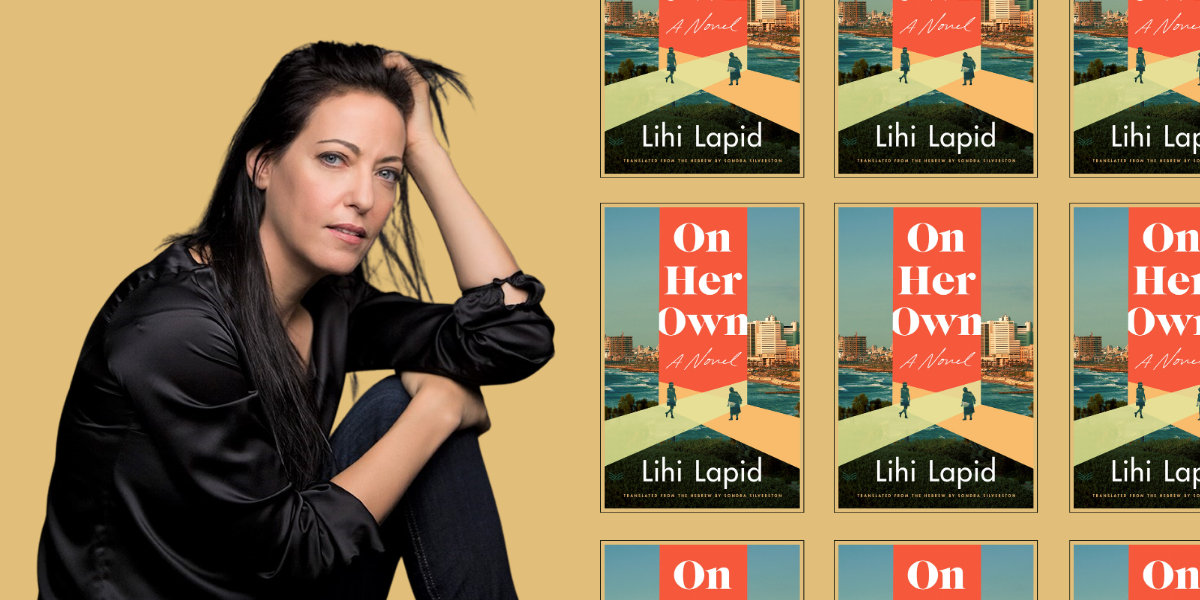Books
Lihi Lapid’s ‘On Her Own’

With powerful prose and imagery, Israeli author, journalist and activist Lihi Lapid immerses readers in the lives of two Israeli women in On Her Own (translated by Sondra Silverston; HarperVia). Her protagonists—Nina, a teenage runaway from a poverty-stricken development town and daughter of a Russian immigrant, and Carmela, a lonely Tel Aviv widow with dementia—are from different sectors of society and at different life stages.
The 55-year-old Lapid, the wife of former Israeli prime minister and current opposition leader Yair Lapid, cleverly bridges the gaps between the two, creating a gritty psychological drama that explores the universal intricacies of family relationships while telling a distinctly Israeli story.
Set between Passover and Yom Ha’atzmaut, Israeli Independence Day, Carmela discovers the battered Nina beneath her apartment building’s stairwell. Confusing Nina for her granddaughter, Dana, whom she has not seen since Dana moved to the United States, Carmela brings Nina home. Nina, witness to a murder and hiding from both her mother and her abusive boyfriend, struggles to keep her identity secret as the two women forge a bond.
The novel, released in Hebrew in 2022, was a best seller in Israel, much like several of Lapid’s previous books. With a mid-March publication date in the United States, On Her Own is the first of her books to be released by a major American publishing house, a development that excites Lapid even as she contends with the anxious reality of living in a country at war.
“Things here in Israel are so difficult these days,” Lapid, who lives in Tel Aviv, said in an interview. “We are just so sad. Even while I am trying to be happy about achieving something that I have dreamt about my entire life, I am not really sure how to announce that this amazing thing is finally happening.” This interview has been edited for brevity and clarity.
What was your goal in writing the book?
My first two books were about what we, as parents, must do for our children, what it means to be a good parent. This book looks at what our kids owe us, or what it means to be a good adult kid.
It also looks at the price of relocation. We live in a generation where people move from country to country. What does that mean if you have parents on the other side of the world, when you have kids who do not speak the language of your parents?
You wrote On Her Own before the war, but do any of its themes connect to what is happening now?
Carmela is the mother of a fallen soldier, and I lived with her for so long in my heart.
From October 7 until now, the news of every soldier that has died in this war just breaks my heart. I see their smiling faces in the newspaper and know that behind every picture, there is a whole family that is collapsing, that is destroyed forever.
You are the president of Shekel, an organization supporting Israelis with disabilities, including providing vocational training and housing. How has the war impacted Shekel’s work?
It has been very, very difficult. There are a lot of people from the South and the North who were evacuated from their homes, many with disabilities or who have children with disabilities. It is not easy to move a child who studies in a special school or an adult who lives in a special home to a place with people who they do not know. At Shekel, we placed hundreds of evacuees with disabilities in all our centers and we set up staff to help integrate them.
Why was it important for you to participate in the “MeToo Unless You Are a Jew” campaign, which condemned the silence of international feminist organizations regarding the assault of Israeli women on October 7?
Kids or young women raped and being held hostage should be kept outside of any political argument, and we need all the people in the world to collaborate on this. I can’t believe that not every woman’s organization is with us on this.
Ruth Marks Eglash is a Jerusalem-based veteran journalist who writes for multiple outlets.










 Facebook
Facebook Instagram
Instagram Twitter
Twitter
Leave a Reply